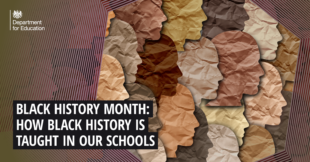
October is Black History Month in the UK and a time to celebrate the contribution black people have made over the centuries in shaping the dynamic and diverse country we have today.
Black History Month is about celebrating and sharing knowledge; celebrating the contribution black people have made to freedoms, our culture and our society – from books, music to art, with authors such as Malorie Blackman, musicians such as Arlo Parks, and scientists such as Maggie Aderin-Pocock, there are many great individuals to celebrate.
This year’s theme is ‘Sharing Journeys’, exploring the lives and stories of the people who came to Britain in the 19th and 20th centuries and helped lay the foundations of today’s diverse society, such as Roy Hackett, a key figure in the Bristol Bus Boycott.
From Roman times onwards, black people have been an integral part of Britain, and the National Curriculum supports teaching about their contribution.
One of the key aims of the history curriculum is to know and understand the history of these islands as a coherent, chronological narrative, from the earliest times to the present day. This includes how people’s lives have shaped this nation and how Britain has influenced and been influenced by the wider world, which helps build an understanding of a shared British and world history.
We want all pupils to benefit from a high quality and diverse history curriculum, which is why we are developing a Model History Curriculum for publication to be published 2024. The Department established an expert panel earlier this year to take this work forward.
Although Black History Month only happens once a year, the teaching of black history doesn’t begin and end there. The curriculum supports children learning about it all year round.
Here we look at a number of ways that black history can be taught in schools using the national curriculum for history from Key Stages 1 to 3, and the subject content requirements for history GCSE at Key Stage 4.
- At Key Stage 1 the curriculum requires key historical events within or beyond living memory to be taught. This could include teaching about the lives of key black historical figures such as Mary Seacole and Rosa Parks, both of whom are used as examples in the Programmes of Study.
The inter-connection that these Islands had with the wider world is an important aspect of teaching in Key Stage 2 and 3, additionally:
- At Key Stage 2 the curriculum requires the study of a non-European society that provides contrasts with British history, for example Benin (West Africa) from 900-1300 AD.
- At Key Stage 3there is a statutory requirement to explore ideas, political power, industry and empire in Britain between 1745-1901. This is so that every child has an understanding of the history of Empire and its consequences. Teachers could, for example, look at Britain’s transatlantic slave trade – its effects and its eventual abolition – including the successful slave-led rebellions, such as the Haitian Revolution, that eventually led to the abolition of slavery. In the UK, this could include the role played by slaves and former slaves such Olaudah Equiano as well as the Somerset Ruling. This Key Stage also requires the study of an aspect of British history that consolidates and extends pupils’ chronological knowledge from before 1066. One of the suggested topics is to look at the impact of the migration of people to, from and within the British Isles.
- At Key Stage 4 pupils should develop and extend their knowledge and understanding of specified key events, periods and societies in local, British, and wider world history which takes in the wide diversity of human experience. Such events can include the world wars and the impact of migration on Britain. There is scope to teach black history within these events and within the broader requirements of the GCSE subject specification.
As part of a broad and balanced curriculum, pupils should be taught about different societies, and how different groups have contributed to the development of Britain, including the voices and experience of black people.
There are many resources schools and parents can use to support teaching black history all-year round, including during Black History Month.
We have suggested some useful sites below:
- The subject association for history, the Historical Association, has many black history resources available including those linked to in their annual Black History Month news story.
- BBC Bitesize – Resources relevant to Black History Month.
- National Archives – ‘World Through a Lens’, photos from over 100 years history, including Africa and the Americas. Many of these could be used as the stimulus for lessons in black history.
- Oak National Academy – Has a selection of black history resources available for both English and history lessons including on the resistance to slavery in Jamaica in the 19th century and on the Windrush.
- Bristol Museums and BBC Teach provide resources on the Bristol Bus Boycott.
- The Royal Mint worked with the West India Committee to create a black British history pack titled ‘Diversity Built Britain’, with resources for schools that are aimed at illuminating stories and accounts of important and inspirational Black people that have lived, worked and studied in the UK.
Further resources are listed in our Black History Month post from 2021.